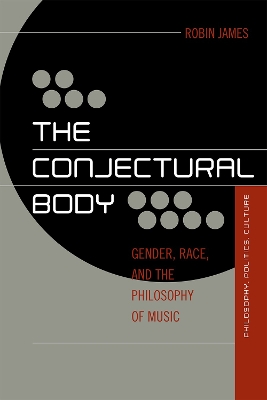Out Sources: Philosophy-Culture-Politics
1 total work
Grounded in continental philosophy, The Conjectural Body: Gender, Race, and the Philosophy of Music uses feminist, critical race, and postcolonial theories to examine music, race, and gender as discourses that emerge and evolve with one another.. In the first section, author Robin James asks why philosophers commonly use music to explain embodied social identity and inequality. She looks at late twentieth-century postcolonial theory, Rousseau's early musical writings, and Kristeva's reading of Mozart and Schoenberg to develop a theory of the "conjectural body," arguing that this is the notion of embodiment that informs Western conceptions of raced, gendered, and resonating bodies. The second section addresses the ways in which norms about human bodily difference-such as gender and race-continue to ground serious and popular hierarchies well after twentieth and twenty-first century art and philosophy have deconstructed this binary. Reading Adorno's work on popular music through Irigaray's critique of commodification, James establishes and explains the feminization of popular music. She then locates this notion of the feminized popular in Nietzsche, and argues that he critiques Wagner by making an argument for the positive aesthetic (and epistemological) value of feminized popular music, such as Bizet and Italian opera. Following from Nietzsche, she argues that feminists ought and need to take "the popular" seriously, both as a domain of artistic and scholarly inquiry as well as a site of legitimate activism. The book concludes with an analysis of philosophy's continued hostility toward feminism, real-life women, and popular culture. While the study of gender, race, and popular culture has become a fixture in many areas of the academy, philosophy and musicology continue to resist attempts to take these objects as objects of serious academic study.
